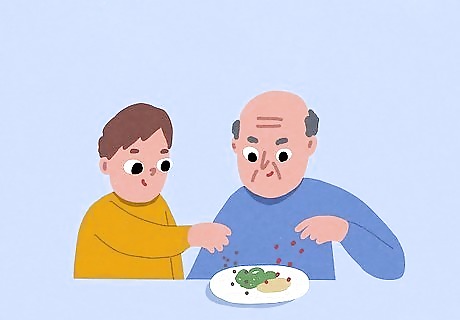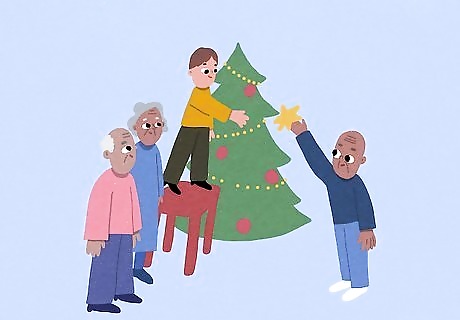
views
Give them a call.

They’ll appreciate hearing your voice and catching up. We know it can be tough to visit your elders if you don’t live near them, so take some time to reach out and call them. Make sure you don’t call too early or late so you don’t wake them up while they’re resting. Just say hello and ask them how their day is going before telling them how you are. Even just a few minutes every day or week shows that you really care. If you’re reaching out to someone who’s a little more tech-savvy, you can even text them or set up a video call so you can see them face-to-face.
Visit them if you can.

Pop in and say hi if you live close enough to them. Plan out a surprise visit or see them at the same time every week to make it a routine. Visiting elderly people in person is a great way to give them social interaction and brighten their day. Let them know what you’ve been up to since you last visited so they feel like they’re still involved in your life. If you do visit them, respect their time if they have a routine or other plans. Be as punctual as possible so they don’t have to wait for you.
Use your manners.

Common courtesy is a great way to let your elders know they’re special. Greet them by shaking their hand, giving them a warm hug, or whatever they’re most comfortable with. When you’re with your elders, talk to them in your normal speaking voice and avoid using words or phrases that could offend or confuse them. As they’re speaking, put down your phone and get rid of other distractions so you give them your full attention. For example, don’t use words like “gramps” or “geezer” since it could offend them. Instead, call them “Mr.” or “Ms.” and their last name or by their first name if they’re comfortable with it. As another example, your elders probably won’t understand the latest slang you hear from TikTok, such as “shade,” “fire,” or “lit,” so explain what you mean. Avoid being condescending toward your elders since it could make them feel disrespected. Be careful not to interrupt your elders. When they pause during a conversation, they may just need a little bit of extra time to collect their thoughts.
Ask them for their advice.

They've lived through a lot, so they might have some helpful pointers. You never know if your elders have struggled with a similar issue as yours, so see if they have any recommendations on how to tackle a tough situation. Listen to their advice thoughtfully and keep asking them questions so you can learn more from their experiences. Seeking their advice really helps your elders feel heard and shows that you appreciate their input. For example, you could ask, “You’ve lived such a fulfilling life; what advice do you have about following your passions?” You could also try something like, “What would you tell yourself about life if you could talk to yourself at my age?”
Chat about their heritage and history.

Your elders will appreciate the chance to share some of their stories. Build your bond by asking questions about what life was like when they were kids, what they learned growing up, and what they remember about their family. Show a genuine interest in who they are and what made them the person they are today. Keep asking questions about themselves so they have a chance to open up and feel connected with you. If you’re talking to an older relative, this can be a good time to talk about your family’s medical history so you can be on the lookout for any common genetic health issues.
Tell them you appreciate them.

Nothing says you value your elders better than telling them directly. Give your elders compliments and admiration so they know exactly how you feel about them. Whenever they leave a positive impact on you, let them know how they made you feel so they realize how important they are to you. Elderly people may not pick up on subtle body language, so directly expressing your feelings also helps them avoid getting confused.
Offer to help with daily tasks.

Reach out if they have a hard time doing things on their own. You can offer to do simple things, like picking up their mail and reading it to them, going for a walk together, or getting them a drink from the kitchen. Ask them if they want your help or if there’s anything you can do to make things a little easier on them. Even a small act of kindness won’t go unnoticed since it shows that you really care. Always ask before stepping in and taking over for them. That way, your elder still feels like they’re independent without you being too overbearing. There may be times where you can’t take full responsibility, such as if your elder needs at-home medical care. In that case, talk with them so you can come up with solutions together.
Enjoy meals together.

Sitting down to eat is a great time to socialize and bond. Bonding during mealtime is such a great tradition, and it can be nice to sit down with your elders if they don’t have many other friends to spend time with. Take them out to eat, bring some takeout, or offer to cook a meal together. While you’re eating, catch up with one another and have fun conversations so they have a chance to socialize. When your elders make snacks or treats, they’ve put in a lot of effort to prepare them for you. Kindly accept and enjoy the treats to show that you’re appreciative of all the care they put in.
Celebrate traditions and milestones with them.

Involving your elders shows that you still want to spend time with them. Rather than making your own plans for holidays or your elders’ birthdays, see how they want to celebrate them. Since they may have some limitations, do your best to work with their schedules and needs so they still have a great time with you. Ask them about any traditions they follow every year and try to incorporate those activities. Encourage your elders to share about their past and memories around their traditions so you get a better understanding of them. It might be hard for elderly people to get around and go places, so bring the festivities to their home or somewhere they’re familiar with.
Help them get comfortable.

When they want to relax, do what you can to make them feel cozy. Be accommodating to your elders if they have specific needs for getting comfortable. Offer them some pillows, give them the softest chair or seat, and let them put their feet up if they need to rest. Whatever you do, be gentle and ask if they need any other assistance before making any changes. Our bodies get more fragile as we age, so be careful when you’re helping out someone who’s elderly. Use slow, gentle movements so you don’t accidentally hurt them.
Let them do some things themselves.

Your elders still want some sense of independence. Try to avoid butting in and doing everything for your elders since they might think you’re being too overbearing. Your elders have lived a long time and want to feel like they’re in control of as much as they can, so don’t treat them like children. If you see your elders obviously struggling, it’s okay to step in and help.
Visit or volunteer at a senior center.

This is a great way to reach out to a lot of elders in your community. Look for senior centers or assisted living communities in your area and see if they have any opportunities to help out. That way, you can visit on a regular basis and bond with some elders that might not see a lot of other people. Participate in activities with them, hold conversations, and celebrate holidays there so you can show that you care about them. You can volunteer and visit these centers even if you don’t have relatives there. During the COVID-19 pandemic, senior centers may have stricter restrictions since elderly people are more at risk. Call ahead and see if you can visit or volunteer.



















Comments
0 comment